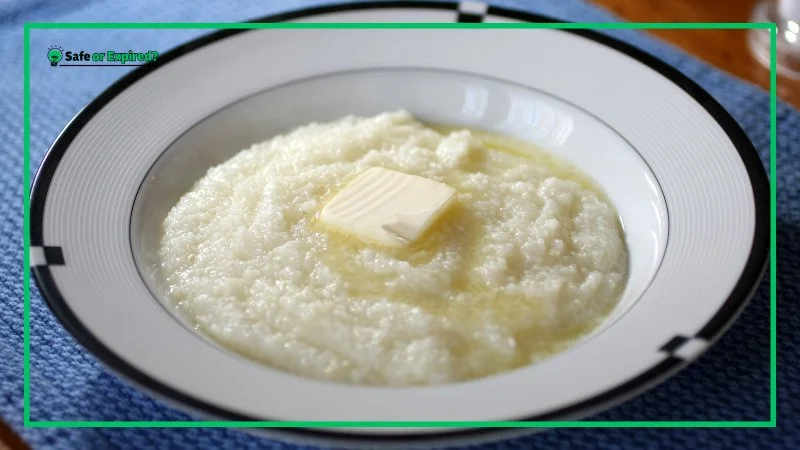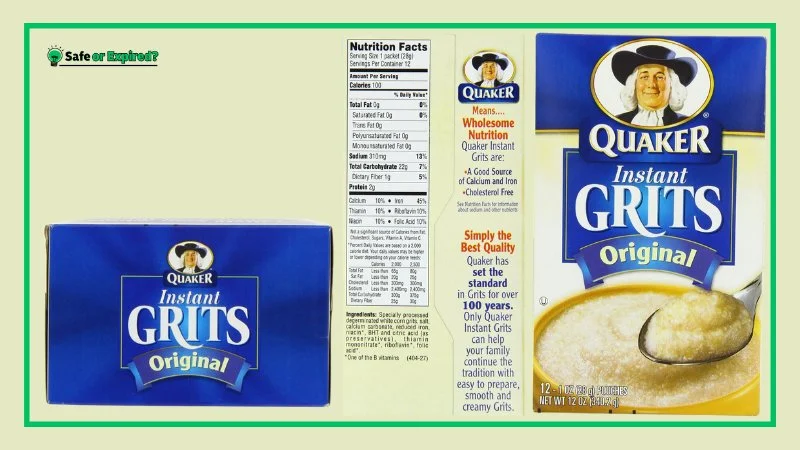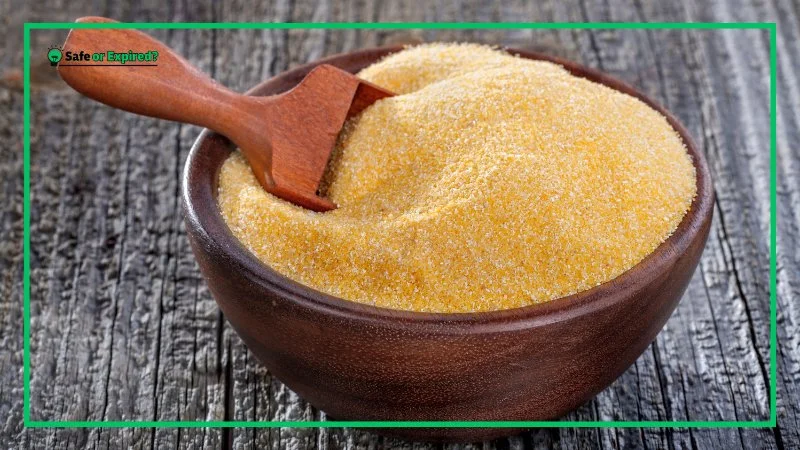We all wonder, “Do grits expire?” when we glance at their bags in the back of our pantries. The answer is yes, but there’s much more to know about its shelf life if you want to enjoy eating it.
Whether you’re a fan of creamy breakfast bowls or a savory dinner side, understanding the do’s and don’ts of grit storage can save you from culinary disappointment.
So, let’s explore the nitty-gritty of grits and ensure your next dish is as fresh as delicious.
Do Grits Expire? [All-Inclusive Details]
Yes, grits do expire, but their shelf life varies. Uncooked grits can last up to 2 years if stored properly, while cooked grits are best consumed within a week (preferably within the first three days). Proper storage is critical to extending their freshness.
So, do grits expire in the fridge? Yes. They can’t stay fresh forever; nothing can stop them from going bad. That’s about the opened grits. But do grits expire if unopened? Yes, they do.
The most common question is, “How long do grits last in the Fridge?” Cooked grits stored in the fridge will remain safe to eat for up to five days. Beyond this, the risk of spoilage increases. If you notice any off-smells, discoloration, or mold, it’s best to discard them.
Here’s a picture of freshly cooked grits:

Another question I get is, “Do Grits Expire in the Freezer?” Freezing extends the shelf life of both uncooked and cooked grits. Uncooked grits, when appropriately frozen, can last indefinitely, though it’s best to use them within two years for optimal quality. Cooked grits can be frozen for up to three months. To freeze, spread them thinly on a baking sheet to freeze individually, then transfer them to an airtight container or freezer bag.
Check out this table to learn more about the grits expiration:
| Storage Location | Opened | Unopened |
| Counter | Opened grits stored on the counter should be consumed within a few months to maintain quality. | Unopened grits can last well past their expiration date if stored properly. For best quality, use within a year of purchase. |
| Fridge | Once opened, storing grits in the fridge can extend their shelf life up to 6 months, particularly for stone-ground varieties. | Storing unopened grits in the fridge can last up to 2 years when refrigerated. |
That’s all about how long do grits expire. Exploring grits and their shelf life might have you wondering about other pantry grains, like popcorn kernels. Do these, too, have an expiration concern? For insights on popping those kernels that have been sitting around, check out “Do Popcorn Kernels Expire? Can You Eat Expired Ones?”
What Are the Factors That Affect Grits Expiration?
The main factors that affect grit’s expiration are form and packaging. Instant grits have longer shelf life than traditional ones. Furthermore, those with preservatives can stay good for a longer time. In addition, temperature fluctuation and air moisture can also spoil the grits sooner.
Form of Grits
Grits come in several forms, including instant, stone-ground, and quick-cooking. Generally, uncooked grits can last a long time if stored correctly. Instant and quick-cooking grits, due to their processing, can last up to a year past their expiration date when kept in a cool, dry place.

Contrarily, traditional stone-ground grits have a shorter shelf life, typically around six months, as they retain more of the natural corn oils, which can go rancid.
Here’s a picture of traditional stone-ground grits:

People often ask, Do Quaker Grits Expire Differently? Well, Quakers typically have a longer shelf life than traditional grits due to their processing and added preservatives.
Packaging and Storage
Grits’ expiration is heavily influenced by their packaging and the conditions in which they are stored. Vacuum-sealed packages help with the shelf life of grits as they protect them from moisture and air.
Presence of Preservatives
The inclusion of preservatives can prolong the shelf life of grits. Many commercially processed grits contain preservatives that help prevent spoilage and extend shelf life. In contrast, organic or natural grits without preservatives may expire sooner.
Temperature Fluctuations
Extreme temperature changes can affect the expiration of grits. Storing grits in an environment with fluctuating temperatures can lead to condensation within the packaging. Remember that this condensation can encourage the growth of mold and spoilage.
Expiration Date and Lot
Manufacturers provide an expiration or best-by date as a guideline for when the product is expected to start declining in quality. This “date” is based on the product remaining unopened and properly stored. The lot number can also provide information on the production date, which can be useful in determining freshness.
Can Grits Go Bad Before the Expiration Date? (The Details)
Grits can potentially go bad before their expiration date if not stored properly. Cross-contamination, air, moisture, pests, and many other things can spoil them sooner than expected. In addition, temperature fluctuations can also impact the grits’ quality and taste.
Improper Storage Conditions
If grits are exposed to moisture, air, or pests due to improper storage, they can spoil before their intended expiration date. Moisture/humidity can lead to mold growth, while air exposure can cause them to become stale.
Temperature Fluctuations
Storage in areas with high-temperature fluctuations can lead to condensation inside packaging, which promotes mold growth and potentially causes the grits to spoil.
Cross-Contamination
Grits stored in containers that were not cleaned properly or that have been used to store other foods might become contaminated, leading to spoilage.
To determine if grits have gone bad, look for signs of spoilage, such as off odors or a change in texture. If any of these signs are present, it’s best to discard the grits.
How to Store Grits Long Term? (Key Tips)
You can store grits long-term by choosing the right container and keeping them in a dry place. You should also avoid moisture from touching the container and ensure no contaminants enter into them. Furthermore, label the containers and ensure you regularly inspect the grits.
Choose the Right Container
To ensure the longevity of grits, store them in airtight containers. This prevents the entry of moisture and pests, both of which can spoil the grits. Glass jars with tight-sealing lids or plastic containers with snap-on lids are ideal options.
Keep in a Suitable Place
Store the container in a cool place, such as a pantry or kitchen cupboard, away from direct sunlight. Note that heat exposure can lead to the degradation of the grits over time.
Avoid Moisture
Moisture is a significant factor in grit spoilage. Ensure that the storage area is free from dampness. Using silica gel packets in the storage area can help absorb any excess moisture.
Label Containers
It’s a good idea to label the containers with the date of purchase or the date when the grits were transferred to the airtight containers. This can help keep track of their freshness and ensure they are used within an optimal period.
Consider Refrigeration for Longer Storage
Stone-ground grits, which have a higher oil content and can become rancid over time, should be stored in the refrigerator or freezer. This can significantly extend their shelf life.
Regular Inspection
Regularly check the grits for signs of spoilage, such as a rancid smell, discoloration, or the presence of pests. If any of these signs are detected, discard the grits to avoid consuming spoiled food.
Can You Eat Expired Grits? (Yes or No?)
Expired grits can still be consumed safely if you have stored them properly and there are no signs of spoilage. If you see mold or smell any foul odor, it’s better to discard them. But if everything feels okay, then you can eat the expired grits without worries.
Check for Spoilage Signs
Before consuming expired grits, inspect them for any signs of spoilage, such as mold, unpleasant odors, or a color change. If any of these signs are present, the grits should be discarded.
Consider the Type of Grits
The type of grits (instant, stone-ground, or quick-cooking) might affect their shelf life. Stone-ground grits, which are less processed and contain more natural oils, might not last as long as more processed types.
Use Your Best Judgment
Ultimately, use your best judgment when deciding to consume expired grits. If the grits look, smell, and taste normal, they are likely safe to eat. However, if there’s any doubt, it’s best to err on the side of caution and dispose of them.
It’s important to note that while expired grits might be safe to eat, their nutritional value and flavor may diminish over time. Always prioritize safety and quality when consuming any expired food product.
FAQ
How Long Do Grits Last After Cooking?
Cooked grits should be consumed within five days if refrigerated and up to three months if frozen.
Do Uncooked Grits Need to Be Refrigerated?
No, uncooked grits do not need to be refrigerated but should be kept in a cool, dry place. Keep looking for signs like mold, off smells, or a change in texture. Discard any grits that show these signs.
Is It Safe to Eat Grits That Have Been Stored Long-Term?
If uncooked grits are stored properly and show no signs of spoilage, they are safe to eat even beyond their best-by date. Always inspect them before use.
Conclusion
Eating grits well past their prime might not be a culinary crime, but knowing how to spot the fresh from the foul ensures every spoonful is a delight. Summing Up the Grits Guide:
- Uncooked grits can last years if stored properly, far beyond the date on the package.
- Cooked grits should be consumed within five days when refrigerated, but they freeze well.
- Inspect grits for spoilage signs before use, especially if they’re past their expiration date.
- The right storage practices can extend the life of your grits, safeguarding your meals against unexpected surprises.
Remember, whether instant or stone-ground, the longevity of your grits hinges on the care you give them. So, here’s to enjoying this beloved grain in its prime, time and time again.

